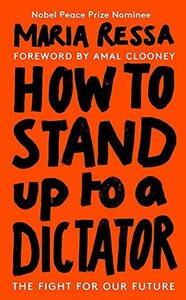Take a photo of a barcode or cover
challenging
emotional
informative
inspiring
reflective
sad
tense
medium-paced
informative
inspiring
tense
fast-paced
informative
reflective
medium-paced
challenging
dark
hopeful
informative
reflective
tense
slow-paced
challenging
dark
emotional
informative
reflective
tense
slow-paced
This book is more of a memoir than I expected. I learned a lot about Maria Ressa and Internet disinformation campaigns. Reading it in May 2025 from the United States was very emotional and sad. It made me feel like crying as fascism and persecution for free speech are here now. They used the same playbook that she tells us about.
challenging
emotional
informative
inspiring
fast-paced
This book isn’t titled How to Bring Down a Dictator. It’s also not How to Safely Stand Up to a Dictator. Ressa doesn’t guarantee success or safety, and she doesn’t pretend that resistance is easy. This is a memoir by a member of a profession (journalism) that’s targeted by authoritarian regimes. The application of Ressa’s life lessons is largely left as an exercise for the reader. The book is a call to arms, not a field manual, but it is filled with important information, principles, and strategies.
medium-paced
informative
inspiring
tense
medium-paced
"You don't know who you are until you're forced to fight for it."
"I preferred confrontation because it would bring resolution."
"Journalism enables facts to survive"
"If you want to test a digital product for the west try it out first in the Philippines"
I tandem read this between the audio and a physical copy and it was great hearing Maria share her own story.
This is an informative and inspiring story of Maria Ressa, first Filipino winner of the Nobel Peace Prize, who fought for journalistic integrity against a corrupt and fascist government in the Philippines.
This story documents how Facebook and social media amplified lies to incite fear and anger since that does more for engagement rates. The Duterte government then would suppress facts and those journalists to continue the spread of false information and mislead/sway the minds of the people.
As Maria explains, when you have a nascent digital product that you want to introduce to the West, you test it out first in the Philippines since so much of the population is online and actively using social media.
This was a warning for the rise of fascism in the West that I think went ignored by America.
This is an informative and inspiring story of Maria Ressa, first Filipino winner of the Nobel Peace Prize, who fought for journalistic integrity against a corrupt and fascist government in the Philippines.
This story documents how Facebook and social media amplified lies to incite fear and anger since that does more for engagement rates. The Duterte government then would suppress facts and those journalists to continue the spread of false information and mislead/sway the minds of the people.
As Maria explains, when you have a nascent digital product that you want to introduce to the West, you test it out first in the Philippines since so much of the population is online and actively using social media.
This was a warning for the rise of fascism in the West that I think went ignored by America.
This was our pick for the book club and I really couldn't get into it.






